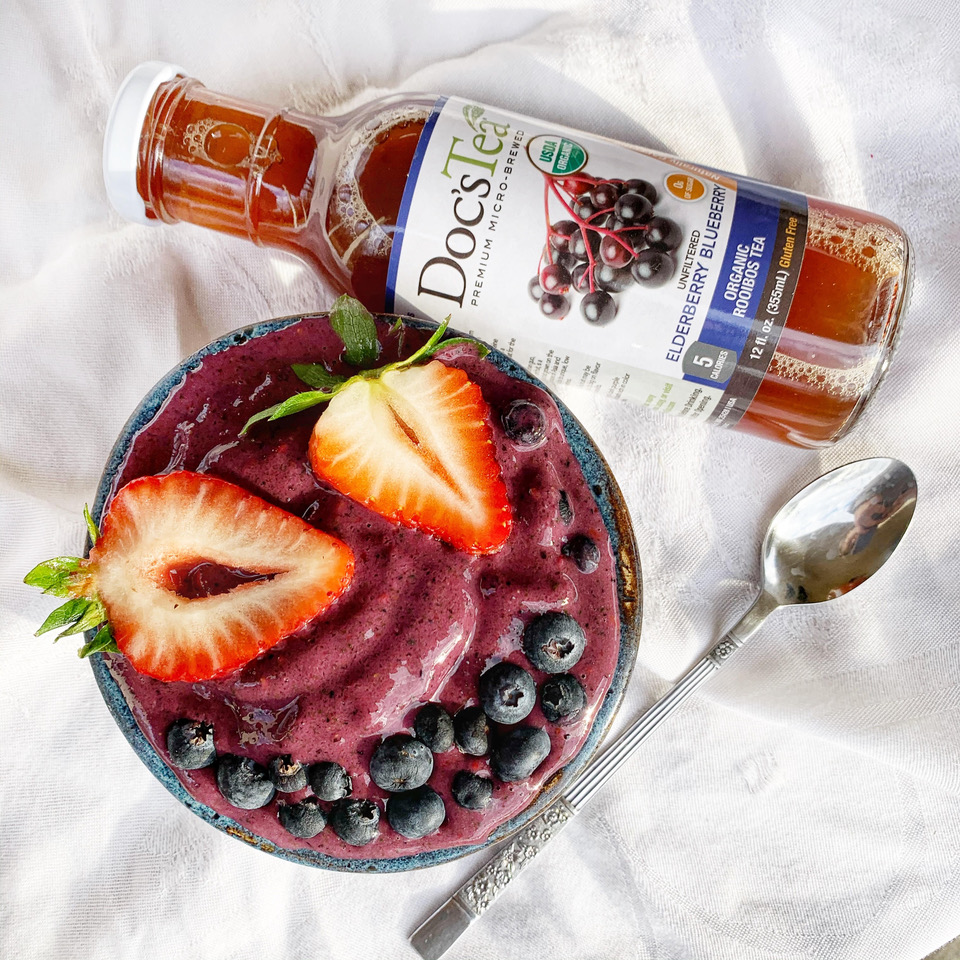What is an Elderberry?
Elderberries are blue or black berries that grow on the Sambucus tree, most commonly called Sambucus nigra. Aside from being packed with a variety of vitamins and minerals, including vitamin A, vitamin C, calcium, and potassium (to name a few), these tiny berries have been known to help relieve flu and cold-like symptoms (2)(5).
Why is it so popular?
The use of elderberry for medicinal purposes dates back to ancient times. The berries were used to treat common ailments including headaches, colds, cough, and tooth and nerve pain (1). Elderberry has stolen the spotlight from over the counter medications due to its ability to shorten the duration of cold and flu symptoms (5). What makes these little berries so powerful is the presence of compounds called anthocyanins, which gives them their dark purple (almost black) color (4). Anthocyanins supply the berries with antioxidant properties such as immune support, brain and eye health, as well as disease prevention (3).
What does the research say?
Although more research is needed, there are some studies supporting the claims that elderberry can be used to treat cold and flu symptoms. One study provided patients with elderberry syrup four times a day. The results showed that the patients who received the elderberry syrup recovered days sooner than those who did not receive the elderberry syrup (5). Amazing!
Should I take elderberry?
While it is not absolutely necessary to supplement with elderberry, it certainly can’t hurt! Give your immune system a boost by trying our Elderberry Blueberry tea. Our tea is micro-brewed with Rooibos tealeaves, resulting in naturally caffeine-free, antioxidant packed beverage that is not only delicious, but good for you, too!
References
1) Assessment report on Sambucus nigra L., fructus. (2014, January 28). Retrieved January 31, 2020, from https://www.ema.europa.eu/en/documents/herbal-report/final-assessment-report-sambucus-nigra-l-fructus_en.pdf
2)FoodData Central Search Results. (2019, April 1). Retrieved from https://fdc.nal.usda.gov/fdc-app.html#/food-details/171727/nutrients
3) Khoo, H. E., Azlan, A., Tang, S. T., & Lim, S. M. (2017). Anthocyanidins and anthocyanins: colored pigments as food, pharmaceutical ingredients, and the potential health benefits. Food & nutrition research, 61(1), 1361779. doi:10.1080/16546628.2017.1361779
4) Tiralongo, E., Wee, S. S., & Lea, R. A. (2016). Elderberry Supplementation Reduces Cold Duration and Symptoms in Air-Travellers: A Randomized, Double-Blind Placebo-Controlled Clinical Trial. Nutrients, 8(4), 182. doi:10.3390/nu8040182
5) Zakay-Rones, Z., Thom, E., Wollan, T., & Wadstein, J. (2004). Randomized Study of the Efficacy and Safety of Oral Elderberry Extract in the Treatment of Influenza A and B Virus Infections. Journal of International Medical Research, 132–140. https://doi.org/10.1177/147323000403200205
Recipe: Immunity Boosting Smoothie Bowl
INGREDIENTS
- 1 cup frozen mixed berries
- 4 ounces Elderberry Blueberry Doc’s Tea
- Optional: 1 Handful of Spinach
Add all ingredients to a blender and blend until smooth. If needed, add a few ice cubes and blend again to thicken the smoothie. Pur into a bowl and top with fresh berries. Serve immediately and enjoy!


